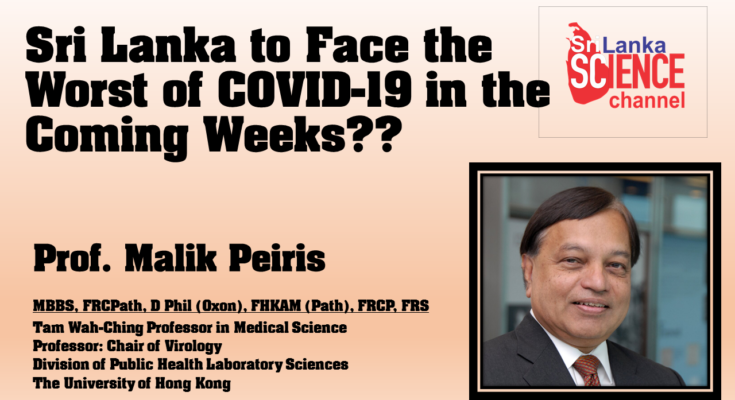With the resurgence of COVID 19 cases due to the Delta variant of the SARS-nCoV2 virus, Sri Lanka is going to face the worst of the COVID-19 outbreak here in Sri Lanka in the coming weeks, Prof. Malik Pieris warned during a presentation he delivered in a special book launching ceremony in Colombo. In a special ceremony held in Colombo on 30th July 2021, National Science Foundation of Sri Lanka launched a book titled “COVID-19, Impact Mitigation, Opportunities and Building Resilience”. The book discusses different perspectives of global relevance based on research, experiences and successes in combating COVID-19 here in Sri Lanka, and contain opinions of experts from different fields that are directly related to the ongoing pandemic. In this event, Prof. Malik Peiris, the world-renowned virologist from University of Hong Kong delivered a special presentation titled “Reflections on a post-pandemic future”.
Given below is the full transcript of the talk by Prof. Malik Peiris.
“Today my topic is Reflections on a post pandemic future, but before we reflect on the future, we need to see where we are, and how we got here. According to the global view of the situation of COVID-19 pandemic, although there was an initial decline globally there has been a recent resurgence of cases globally, including in the South Asian region. And this is primarily due to the new variant, which named as the Delta variant. And this of course, played havoc in India. And I’m afraid I have to say that. We are going to have a major impact from this particular variant on Sri Lanka in the coming weeks. I know this is a this is a happy occasion but as a public health professional I would be remiss in my duty if I do not warn, that Sri Lanka is going to face the worst COVID outbreak that it has faced in the months ahead. Congratulations to the Government and Professor Jayasumana for pushing forward the vaccination Campaign, which is going on very well right now, however, as you all know, you need two doses of vaccine to have a significant immunological impact and in the next one or two months, that is not going to protect us from the impact of the Delta variant. So, I hope the Sri Lankan general public is well advised of this eminent danger ahead of them.”
“This book describes many other impacts of this covid-19 pandemic on emerging countries excluding China. For an example the countries are going to experience a major impact on their Economies, GDP, Education, Mental health and society. In general, this has been certainly a global issue that all countries have had to deal with. So, where did this come from? Many of us thought that pandemics like this were a thing of the past. However, if we look closely, I think we would have seen that over the last 20-30 years, there have been repeated episodes of major infectious diseases, and many of them were completely new to us. Some of the most prominent examples for those are Avian flu, SARS the H1N1, swine flu, pandemic Ebola, and most recently zika. So, I’m afraid it was not a surprise that we would have to face a major epidemic again.”
“If we look at the contributing factors behind these pandemics, there are many. These are not just Healthcare related factors. First, there are factors directly related to Human activities, like the fast population growth, rapid urbanization, very intensive travel across places and countries, intensive trade, the way we raise our livestock, wild life and animal trade. At the same time disease casing agents also mutate and come up with adaptations. Then there are environment related factors including ecological degradation and change, deforestation, climate change and many more. So, these are really very complex issues that are contributing to the emergence of these pandemics, and I’m afraid these still continue to challenges unless we really pay our attention and try to reduce and mitigate these risks.”
Is this pandemic completely unexpected?
“Bill Gates, probably somebody that everybody knows in 2015 gave a TED talk in which he warned very starkly of exactly what we would face. And one might think that coronaviruses are completely new and has nobody heard about. But again, it was beginning of 2019. I was taking part in a keystone Symposium preparing for the next pandemic. And I was asked the question, what are the viruses that might cause the next pandemic and I said, influenza and corona viruses. So, fortunately, the scientific Community has been very alert to this possibility. I gave you the examples of the previous epidemics such as Ebola, which was, of course, terrible in West Africa. But luckily, it didn’t spread very rapidly. So, the world didn’t take too much notice. And, we had the swine flu in 2009 which spread very rapidly, but luckily, it was a very mild pandemic. So again, we didn’t take much notice, and we kept dodging bullets one after the other, but this particular bullet hit and it is very painful. It was inevitable. There was plenty of warning but the world failed to take heat and make the necessary Investments and preparations to deal with it.”
“But there was some response after Ebola indeed. After the Ebola outbreak number of global commissions, most notably the US National Academy of Medicine that was headed by a banker Peter Sands made quite a number of recommendations. They predicted that the annualized become economic loss from epidemics would be over 60 billion US dollars and they suggested that an annual investment of four and a half billion to upgrade Public Health Systems of low and middle income countries, enhancing the capacity of WHO investment in research and development, particularly in vaccine and antiviral development would be important. But unfortunately, by the time action began to be taken on these issues, the pandemic had already hit us but some of those measures that were taken did help in the development of vaccines for covid-19 for example.”
“Now, Countries have these very expensive toys, like an aircraft carriers, that can cost around 13 billion US Dollars without the cost of running it. Countries like United States have many of these aircraft carriers, but it did not protect the United States from the ravages of this pandemic. So, I think the issue is we are very much ready to put down huge amounts of money for things like defense. But as Nations, we have not been willing to invest in global health security, which is, equally or probably even more needed.”
“So, as I pointed out, many of these infections, come to humans from animals, and are needed to be tackled in an integrated Manner. This method is called a one health approach, which is the collaborative efforts of multiple disciplines, working locally nationally and globally to attain optimal health for people, animals and the environment. So, we really have to take a holistic view if we are going to tackle these challenges for the future.”
“Another Issue that really hit hard, was the impact on Global Supply chains. Initially it was a just a shortage of masks, but then it was other things like ventilators, oxygen, Etc. And the whole global supply chain as you know is still feeling the impact of the pandemic. In a book written by Michael Osterholm. It’s very clearly laid out the impact of a pandemic on Global Supply Chains. It’s not just the health issues but all the other implications that flow from the impact on disrupting our globalized trading and Supply patterns.”
Vaccine Iniquity
“UNDP has recently estimated that low-income countries would add 38 billion to their GDP for this year if they had the same vaccination rates as high-income countries. The book by Michael Osterholm illustrates ways of dealing with a pandemic, like this is not just a matter of Health Care, it requires understanding the social context, it requires leadership, it requires understanding the populations perception of threat and it requires good communication as well. taking all these two Whether understanding threat perception and the social context.”
Different Variants, Different Threats
“Now, of course, the pandemic is not going to go away, we heard the term virus variants. These viruses replicate in living cells, and when they replicate, they acquire mutations. And this is not a design process but it’s the blind force of evolution which will throw up a range of variants and of course, the viruses that are best suited to transmit becomes selected and become prominent. That’s how these different variants arise. So, these variants are not selected for virulence or causing more severe disease. They are selected for transmissibility. This is why the alpha variant that hit Sri Lanka in earlier this year was more transmissible than the previous one. But the Delta V Variant which is currently in Sri Lanka is even more transmissible than the alpha variance. The virus is becoming more and more transmissible and I’m afraid these different viral variants will continue to emerge. So, SARS coronavirus is here to stay, but we need to learn to live with it. And certainly, effective vaccines will be an important component in mitigating severe disease and death. But, We have to understand that we still need to modify our behavior in the new normal.”
Things Beyond pandemics
“Right now, pandemics are not the only thing we have to deal with. Because what we have at the moment at the planetary level is that humankind is consuming the resources of this planet. In nature, nothing grows forever and that same principal is applicable to human species as well. At least our consumption cannot grow in an uncontained and sustainable fashion. As humankind what we are doing now risks rupturing the limits of planetary sustainability, and this is quite visible in terms of climate, biodiversity loss, air pollution and in many other areas that are important to keep the planet earth as a habitable environment. And I’m sure if you watch the news recently, you’d have heard about the floods in Europe, the fires in western Canada. Just like those, there are many challenges that planet earth has to face right now other than the pandemics. So, we really have to change the way we do things. This COVID 19 itself can be taken as a huge teaching opportunity in acting against these and even more dire, Global challenges.”
“Summery for a better Post Pandemic Future
- We can’t think of going back to the whole normal. Instead we have to think about going back to a new and better.
- Be humble in the face of nature. I think humankind seems to have got the impression that we can conquer the forces of nature, but we are far from that and covid-19 has clearly shown us all times before it is too late.
- Heed warnings from nature, before it’s too late
- Establish a strong research base and a strong Public Health infrastructure.
- We need a multidisciplinary approach to mitigate the effects from these pandemic related problems.
- The need for effective communication, particularly the counter fake news on social media.
- COVID-19 is not the last pandemic. So we need to learn from this event, to prepare for the future to mitigate risks and enhance the capacity to respond.
- There are many other threats other than the pandemics. The issues like climate change, environmental pollution, loss of biodiversity are even greater threats but more Insidious threats than the pandemic, which we really have to counter.”
This landmark publication was launched on 30th July 2021 at 3:00 pm at the BMICH under the distinguished patronage of Prof. G.L. Peiris, Minister of Education and Prof. Channa Jayasumana, State Minister of Production, Supply and Regulation of Pharmaceuticals. Dr. Dushni Weerakoon, Executive Director of the Institute of Policy Studies, also delivered a special talk on “Recovering from COVID-19: The Economic Imperatives”.
The book consists of nine sections, namely Health, Mental Health and Wellbeing, Economy, Environment (Natural and Built), Resilience and Society and Education with three cross-cutting themes, namely Governance, Supply Chain, and Research and Inventions.
This book was published by the NSF under the Creative Commons license that enables the free distribution of soft copies of an otherwise copyrighted “work” and hard copies of the volume will be available as an NSF publication.




